-

人教版新目标初中英语八年级下册It’s a nice day, isn’t it教案2篇
"Hello! Welcome to English class! Introduce yourself. Meet your new classmates." That's what the teacher says. What do you say? "Oh no!" It can be difficult talking to new people. But it can be fun, and you can make friends. How do you do it? Make small talk. Small talk is polite conversation. "Wang Nan is a great pingpang player, isn't she?" "I'd love to meet her, wouldn't you?" "It's been raining a lot, hasn't it?" Tag questions are a form of polite speech. To make small talk successfully, you should know how to make them. You should also know what topics to talk about. Try to learn this unit carefully. The next time you're in English class, you'll find out. Making small talk's easy, isn't it? (“你好!欢迎你!请做一下自我介绍。认识一下你的新同学。”通常在课上老师会这样说。你会说什么呢?“噢,不!”与陌生人谈话太困难了。但是这也很有意思,并且你还能交到朋友。你该怎么做呢?闲聊。闲聊指得是礼貌的对话。“王楠是一个很棒的乒乓球运动员,不是吗?”“我希望自己能认识她,你呢?“今年的雨水很多,不是吗?”反意疑问句是一种礼貌用语。为了使得谈话成功,你应该知道怎样去进行闲聊。你还应该知道与不同的人该谈论什么样的话题。认真的学习这个单元吧,下次在英语课上,你会发现与大家展开谈话是一件很容易的事情,不信我们来试试。)

人教版新目标初中英语八年级下册He said I was hard-working教案2篇
This activity introduces some new vocabulary and provide oral practice using the target language.Task 1 . Ask four students to stand in front of the class, and the teacher asks them the following questions as a reporter.1.What are you going to do when you grow up?2.What are you going to do next week?3.What are going to do after school?The students will give different answers, then ask a good student to report what they said.I am going to e a doctor.What did she say?----------She said she was going to be a doctor.I am going to have a party on Friday night.What did he say?-------He said he was going to have a party on Friday night.I am going to do my homework.What did she say ?------ She said she was going to do her homework.I am going home after school.What did she say?-----She said she was going home after school.Say In this unit we are going to learn to use words like to report what someone said.Task 2. Read the instructions. Then ask a student to read the four questions. And write the words on the Bb. Explain what soap opera is.Task 3. Ask the students to Look at the pictures, point out the TV screens in the picture. Ask one girl to read what Marcia said.What did Marcia say? She said She said she was having a surprise party for Lana on Friday night. Repeat the other pictures in the same way.Activity3. Listen and number the pictures in activity 1a.
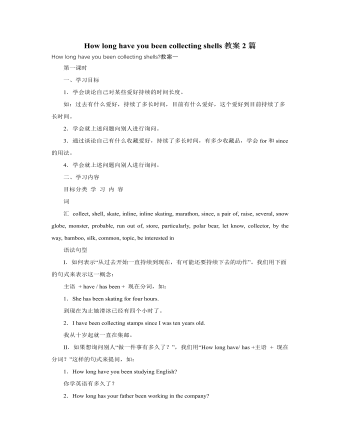
人教版新目标初中英语八年级下册How long have you been collecting shells教案2篇
Step Ⅱ Show the new words on the screen and teach the new words. Read the new words to students and ask them to repeat.Step Ⅲ 3aThis activity introduces new vocabulary and provides reading practice using the target language.In this activity first look at the four pictures.T: What can you see in the pictures?Ss: Four snow globes.T: Right. There are four snow globes in the pictures. And what are they?Ss: They are a monster, two polar bears, two penguins and a birthday cake.Write these words on the blackboard: snow globe; monster; polar bear; penguin and birthday cake. Read them to the class and ask students to repeat each one. Make sure students understand each word.Use a computer to show the E-mail message on the screen and read the message to students.Get students to read the e-mail on their own, and then draw lines connecting each snow globe and its description.Correct the answers.AnswersA line should connect each snow globe picture with the words that describe it in the letter.Step Ⅳ 3bThis activity provides writing practice using the target language.First review Activity 2a on Page 47.Then ask students to complete the message according to Activity 2a.Some partial sentences are given to students. Write about one person's collection.When students work, walk around the room checking the progress and offering help as needed.When they finish, ask some students to read their messages to the class.

人教版新目标初中英语八年级下册What were you doing when the UFO arrived教案2篇
(一).知识方面: 1.培养学生能运用过去进行时来描述、谈论过去某个时间正在发生的事情或动作的意识和能力,能就过去某个时间正在发生的动作做出正确的描述。 2.培养学生的想象力和角色扮演的合作能力。 3.培养学生讲述过去发生的事情经过的能力。能正确运用一般过去时来讲述故事。 (二).技能方面: 1.本单元的语言目标是Talk about past events and tell a story(谈论过去的时间和讲述一个故事),围绕这一目标,要涉及句型: What were you doing when the UFO arrived? ----I was sitting in the barber’s chair. The barber was cutting my hair. 因此必须学习standing、studying、cleaning、sleeping、cooking、making、eating、cutting、等表示地点的词,以便为上述句型提供语言材料。2.学习过去进行时的有关知识。Was/were+现在分词,是该时态的表达式。 3.在学习过程中,要区分The boy was walking down the street when the UFO landed.和While the boy was walking down the street, the UFO landed.这两种由when和while引导的状语从句的句型结构。注意它们的不同。

人教版新目标初中英语九年级上册Teenagers should be allowed to choose their own clothes教案2篇
Step 1 Greeting Greet the class and check the homeworkStep 2 A duty report The S on duty gives a report on the rules in his home and lead in 3a “Sun Fei’s and Wu Yu’s rules” Step 3 ReadingSs read the conversation and write the two girls’ rules in the chart. Check the answers.Get Ss to read after the tape and then read aloud by themselves. Then, T explains the language points.Step 4 Pairwork 3bRole play. Use the information in chart to practice with the conversation in 3a covered. They can look at the sample conversation in the right box.Step 5 Task 2 “Who’s the best reporter?”Make a survey by asking any 5 students the questions in the chart in activity 4. Then give out a report about it. See who is the best reporter? And the best reporter will get a nice ball-pen.Step 6 Summary and homework:Write out the report in your exercise-books.Period ThreeStep 1 Greeting and a duty reportThe S gives a duty report talking about his experience of being late for school. Lead in the question “Do you ever get to school late? How often do you get to school late? Always, usually, sometimes, or never?Step 2 1a Get Ss to finish writing.Step 3 Pairwork 1b Get Ss to talk about their answers with their partners using the sample conversation in the box on the right.Step 4 Listening practice2a Lead-in: What will happen if you get to school late? What about Peter? Let’s listen to a conversation between Peter and his father. Get Ss to finish 2a (As usual, for the first time, Ss only listen.) Check the answers.

人教版新目标初中英语九年级上册Where would you like to visit教案2篇
The First PeriodⅠ.Teaching Aims and DemandsKnowledge Objects(1) Key Vocabularytiring, educational, fascinating, thrilling, peaceful, exotic, trek, jungle, take it easy, explore, historic, site(2) Target LanguageWhere would you like to go on vacation?I’d like to trek through the jungle, because I like exciting vacations.2. Ability Objects(1)Train students to talk about places they would like to visit with the target language.(2)Train students to describe vacations with different adjectives.(3)Train students' listening skill.3. Moral Object,It′s more interesting to go on vacating somewhere instead of staying at home.Ⅱ. Teaching Key Points1. Key Vocabularytiring, educational, fascinating, thrilling, peaceful, exotic, trek, jungle, take it easy, explore, historic, site2. Target LanguageTalk about different places with the target language.Ⅲ. Teaching Difficult Points1. Describe vacations with different adjectives.2. Talk about different places with the target language.Ⅳ. Teaching Methods1. Teaching by illumination2. Teaching by doing chain drills3. Teaching by pairworkⅤ. Teaching Aids1. A tape recorder2. Some pictures of different places with famous views

人教版新目标初中英语九年级下册We’re trying to save the manatees教案2篇
本单元主要围绕着有关濒临灭绝的动物这一话题,学习了应该怎样保护我们的环境,以及就某一问题展开辩论。目标提示语言目标能够运用所学知识,就某一问题展开辩论。认知目标1、复习一些语法:现在进行时、一般现在时、用used to 表示一般过去时、现在完成时、一般过去时的被动语态。2、学会表达同意和不同意。3、学会以下基本句型:We’re trying to save the manatees.Manatees eat about 100 pounds of food a day.There used to be a lot of manatees.In 1972,it was discovered that they were endangered.Some of the swamps have become polluted.情感目标了解一些濒临灭绝的动物的生活习性和濒临灭绝的原因,教育学生应该如何保护环境。教学提示充分利用多媒体等教学设备,创设与本课话题相关的情境,如各种不同种类的动物、动物园以及有关环境的画画等等。围绕着本单元的教学目标,设计一些贴近学生实际的教学任务,如让学生谈论自己最喜欢的动物,如何拯救濒危动物,如何保护环境等等。让学生根据所学知识,就动物园是否对动物有利以及其他的话题进行辩论。
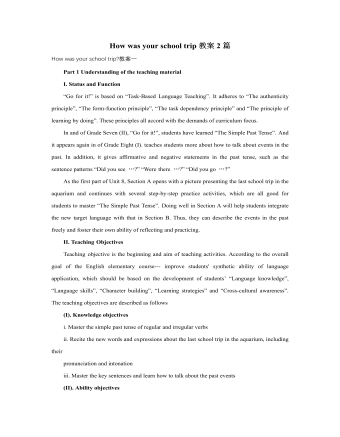
人教版新目标初中英语八年级上册How was your school trip教案2篇
“Go for it!” is based on “Task-Based Language Teaching”. It adheres to “The authenticity principle”, “The form-function principle”, “The task dependency principle” and “The principle of learning by doing”. These principles all accord with the demands of curriculum focus.In and of Grade Seven (II), “Go for it!”, students have learned “The Simple Past Tense”. And it appears again in of Grade Eight (I). teaches students more about how to talk about events in the past. In addition, it gives affirmative and negative statements in the past tense, such as the sentence patterns “Did you see …?” “Were there …?” “Did you go …?” As the first part of Unit 8, Section A opens with a picture presenting the last school trip in the aquarium and continues with several step-by-step practice activities, which are all good for students to master “The Simple Past Tense”. Doing well in Section A will help students integrate the new target language with that in Section B. Thus, they can describe the events in the past freely and foster their own ability of reflecting and practicing. II. Teaching ObjectivesTeaching objective is the beginning and aim of teaching activities. According to the overall goal of the English elementary course--- improve students' synthetic ability of language application, which should be based on the development of students’ “Language knowledge”, “Language skills”, “Character building”, “Learning strategies” and “Cross-cultural awareness”. The teaching objectives are described as follows(I). Knowledge objectivesi. Master the simple past tense of regular and irregular verbsii. Recite the new words and expressions about the last school trip in the aquarium, including their pronunciation and intonation
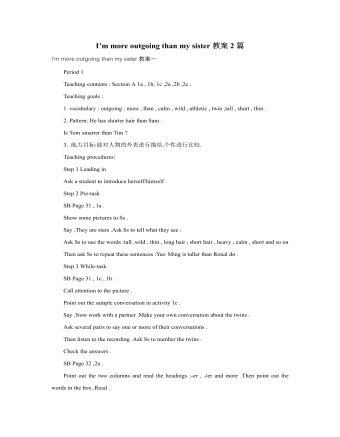
人教版新目标初中英语八年级上册I’m more outgoing than my sister教案2篇
1 交通工具的比较此活动为小组活动。学生通过讨论找出到达某一城市可乘坐的各种交通工具,并选择最佳出行方式。Teacher:We’re going to Shanghai. How many ways can we use to get there? Yes, there are four ways: by bus, by plane, by train, by ship. Please discuss how you are going to get there.操作建议:(1)学生以小组为单位展开活动,谈论本组所选择的交通工具。(2)各组选代表向全班汇报,阐述本组所选择的交通工具的利和弊。完成任务所需要的语言结构:We can go there by ship. It’s more comfortable and cheaper than any other transportation.We can go there by bus. It’s cheaper but it takes longer time.2 哪个城市更合适?此活动具有挑战性。假设中国要举行2014年世界杯足球赛,分别从历史,人文,天气等方面对各城市(北京,大连,上海,昆明)进行比较,选择最佳举办城市。T: Imagine China is holding the 2014 FIFA World Cup. Which city do you think is the best for the World Cup, Beijing, Dalian, Shanghai or Kunming? Let’s work in groups. If you choose Beijing, please join the Team Red. If you chose Dalian, please join the Team White. If you choose Shanghai, please join the Team Blue. If you choose Kunming, please join the Team Green. Please show us its advantages. Then let’s see which team will win.

人教版新目标初中英语九年级上册How do you study for a test教案2篇
内容提示本单元主要内容是学会利用verb十by/with gerund表示方式方法来讨论学习英语的策略,认识自己在学习方面的长处和不足。初步了解现在完成时的结构和用法。现在完成时由助动词have/has+动词的过去分词构成,主要表示过去发生的某一动作对现在仍有影响或造成的后果,常与already,yet,just,ever,never等副词连用。教学目标一、学习目标(Language Goal) 1. Talk about how to study . 学会讨论各种学习方法和策略。2. Find out your suitable learning methods. 找出适合自己的学习方法。 二、语言结构(Language Structures) 1. Verb + by with gerund by+动名词短语 表示“通过…途径,方法” 2. How questions have引导的特殊疑问句 三、目标语言(Target Language) 1. How do you study for tests ? 你是怎样准备考试的?Well , I study by working with my classmates. 哦,我和同学们一起学习。2. Have you ever studied with a group ? 你曾经参加过学习小组吗?Yes , I have . I’ve learned a lot that way . 是的,参加过。通过这种方式我学了许多。
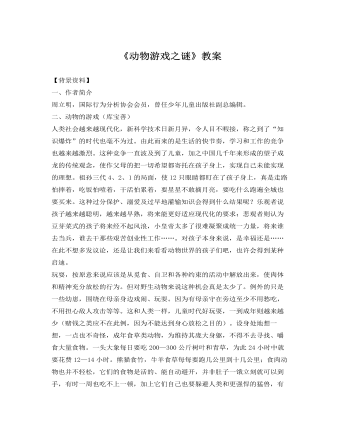
人教版高中语文《动物游戏之谜》教案
二、动物的游戏(库宝善)人类社会越来越现代化,新科学技术日新月异,令人目不暇接,称之到了“知识爆炸”的时代也毫不为过。由此而来的是生活的快节奏,学习和工作的竞争也越来越激烈。这种竞争一直波及到了儿童,加之中国几千年来形成的望子成龙的传统观念,使作父母的把一切希望都寄托在孩子身上,实现自己未能实现的理想。祖孙三代4、2、1的局面,使12只眼睛都盯在了孩子身上,真是走路怕摔着,吃饭怕噎着,干活怕累着,要星星不敢摘月亮,要吃什么跑遍全城也要买来。这种过分保护、溺爱及过早地灌输知识会得到什么结果呢?乐观者说孩子越来越聪明,越来越早熟,将来能更好适应现代化的要求;悲观者则认为豆芽菜式的孩子将来经不起风浪,小皇帝太多了很难凝聚成统一力量,将来谁去当兵,谁去干那些艰苦创业性工作……。对孩子本身来说,是幸福还是……在此不想多发议论,还是让我们来看看动物世界的孩子们吧,也许会得到某种启迪。
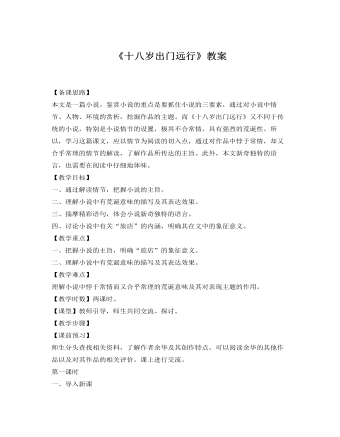
人教版高中语文《十八岁出门远行》教案
【备课思路】本文是一篇小说。鉴赏小说的重点是要抓住小说的三要素,通过对小说中情节、人物、环境的赏析,挖掘作品的主题。而《十八岁出门远行》又不同于传统的小说,特别是小说情节的设置,极其不合常情,具有强烈的荒诞性。所以,学习这篇课文,应以情节为阅读的切入点,通过对作品中悖于常情,却又合乎常理的情节的解读,了解作品所传达的主旨。此外,本文新奇独特的语言,也需要在阅读中仔细地体味。【教学目标】一、通过解读情节,把握小说的主旨。二、理解小说中有荒诞意味的描写及其表达效果。三、揣摩精彩语句,体会小说新奇独特的语言。四、讨论小说中有关“旅店”的内涵,明确其在文中的象征意义。【教学重点】一、把握小说的主旨,明确“旅店”的象征意义。二、理解小说中有荒诞意味的描写及其表达效果。
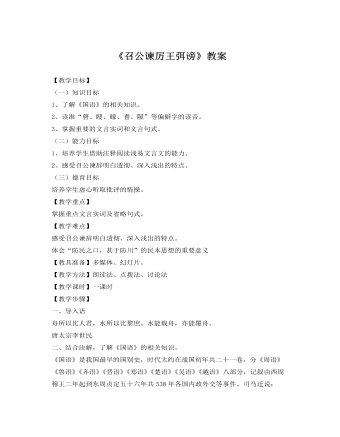
人教版高中语文《召公谏厉王弭谤》教案
六、结合讲解和译文,学生三读课文,分析内容。(一)解析第一段内容1、请找出能体现厉王性格特征的词语,说说厉王是一个什么样的人。“虐、怒、杀”暴虐凶残、残忍昏庸2、正由于厉王的行动,导致国人怎样?(从文中找出原句)谤王——道路以目3、“国人莫敢言”,是国人真的沉默无语,俯首听命了吗?没有,而是即将“在沉默中爆发”,人民在沉默中孕育着反抗,这是高压下的沉默,是火山喷发前的死寂。(二)浏览第二段本段主要是召公的谏辞。1、召公对厉王弭谤的方法有何批评?(原文)明确:是障之也。(随后用了“防民之口,甚于防川”来说明堵塞言论的危害性。并指出“为水”的最有效的办法是“导”,“为民”的最有效的办法是“宣”。)2、古代天子听政如何广开言路?明确:直接的:①使公卿至于列士献诗,②瞽献曲,③史献书,④师箴,⑤瞍赋,⑥曚诵,⑦百工谏。
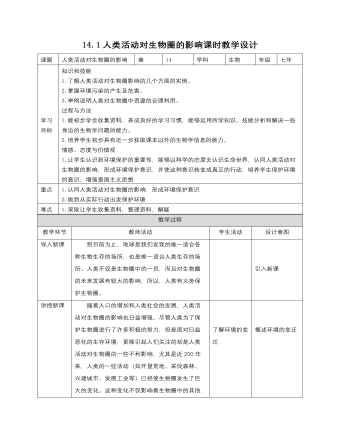
初中生物北师大版七年级下册《第14章第1节人类活动对生物圈的影响》教案
知识和技能 1.了解人类活动对生物圈影响的几个方面的实例。 2.掌握环境污染的产生及危害。 3.举例说明人类对生物圈中资源的合理利用。 过程与方法 1.能初步学会收集资料,养成良好的学习习惯,能够运用所学知识、技能分析和解决一些身边的生物学问题的能力。 2.培养学生初步具有近一步获取课本以外的生物学信息的能力。 情感、态度与价值观 1.让学生认识到环境保护的重要性,能够以科学的态度去认识生命世界,认同人类活动对生物圈的影响,形成环境保护意识,并使这种意识转变成真正的行动,培养学生保护环境的意识,增强爱国主义思想1.认同人类活动对生物圈的影响,形成环境保护意识 2.做到从实际行动出发保护环境1.采取让学生收集资料,整理资料,解疑
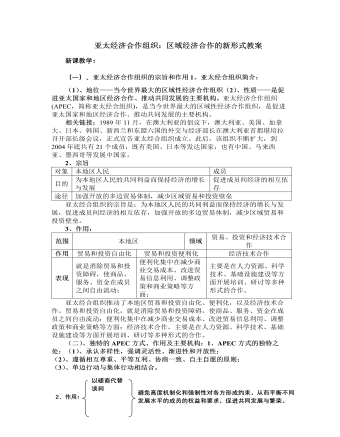
人教版高中政治选修3亚太经济合作组织:区域经济合作的新形式教案
(一)、亚太经济合作组织的宗旨和作用1、亚太经合组织简介:(1)、地位——当今世界最大的区域性经济合作组织(2)、性质——是促进亚太国家和地区经济合作、推动共同发展的主要机构。亚太经济合作组织(APEC,简称亚太经合组织),是当今世界最大的区域性经济合作组织,是促进亚太国家和地区经济合作、推动共同发展的主要机构。相关链接:1989年11月,在澳大利亚的倡议下,澳大利亚、美国、加拿大、日本、韩国、新西兰和东盟六国的外交与经济部长在澳大利亚首都堪培拉召开部长级会议,正式宣告亚太经合组织成立。此后,该组织不断扩大,到2004年底共有21个成员,既有美国、日本等发达国家,也有中国、马来西亚、墨西哥等发展中国家。亚太经合组织的宗旨是:为本地区人民的共同利益而保持经济的增长与发展,促进成员间经济的相互依存,加强开放的多边贸易体制,减少区域贸易和投资壁垒。
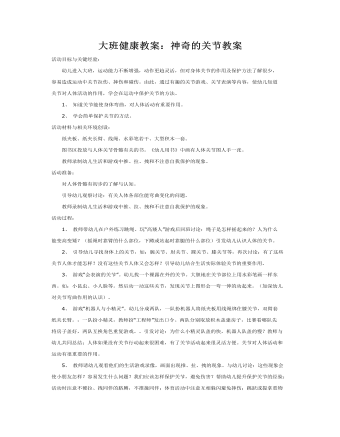
大班健康教案:神奇的关节教案
1、知道关节能使身体弯曲,对人体活动有重要作用。2、学会简单保护关节的方法。 活动材料与相关环境创设: 纸夹板、纸夹长臂、线绳、水彩笔若干、大型积木一套。 图书区投放与人体关节骨骼有关的书。《幼儿用书》中画有人体关节图人手一张。 教师录制幼儿生活和游戏中推、拉、拽和不注意自我保护的现象。 活动准备: 对人体骨骼有初步的了解与认知。 引导幼儿观察讨论:有关人体各部位能弯曲变化的问题。 教师录制幼儿生活和游戏中推、拉、拽和不注意自我保护的现象。 活动过程:1、教师带幼儿在户外练习跳绳、玩“高矮人”游戏后回班讨论:绳子是怎样摇起来的?人为什么能变高变矮?(摇绳时靠臂的什么部位,下蹲或站起时靠腿的什么部位)引发幼儿认识人体的关节。
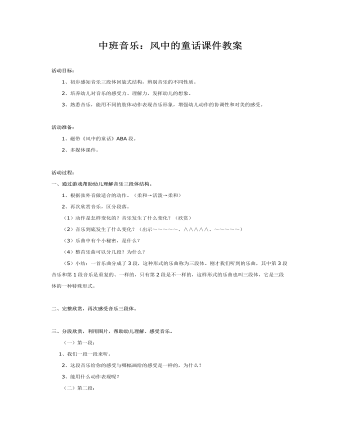
中班音乐:风中的童话课件教案
2、培养幼儿对音乐的感受力、理解力,发挥幼儿的想象。3、熟悉音乐,能用不同的肢体动作表现音乐形象,增强幼儿动作的协调性和对美的感受。 活动准备:1、磁带《风中的童话》ABA段。2、多媒体课件。 活动过程:一、通过游戏帮助幼儿理解音乐三段体结构。1、根据弦外音做适合的动作。(柔和→活泼→柔和)2、再次欣赏音乐,区分段落。 (1)动作是怎样变化的?音乐发生了什么变化?(欣赏) (2)音乐到底发生了什么变化?(出示~~~~~、∧∧∧∧∧、~~~~~) (3)乐曲中有个小秘密,是什么? (4)整首乐曲可以分几段?为什么? (5)小结:一首乐曲分成了3段,这种形式的乐曲称为三段体。刚才我们听到的乐曲,其中第3段音乐和第1段音乐是重复的、一样的,只有第2段是不一样的,这样形式的乐曲也叫三段体,它是三段体的一种特殊形式。
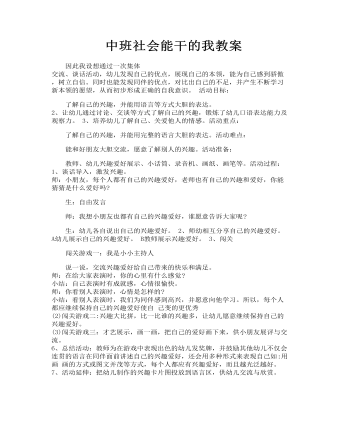
能干的小手中班教案中班社会能干的我教案
1、谈话导入,激发兴趣。 师:小朋友,每个人都有自己的兴趣爱好,老师也有自己的兴趣和爱好,你能猜猜是什么爱好吗? 生:自由发言 师:我想小朋友也都有自己的兴趣爱好,谁愿意告诉大家呢? 生:幼儿各自说出自己的兴趣爱好。 2、师幼相互分享自己的兴趣爱好。A幼儿展示自己的兴趣爱好。 B教师展示兴趣爱好。 3、闯关 闯关游戏一:我是小小主持人
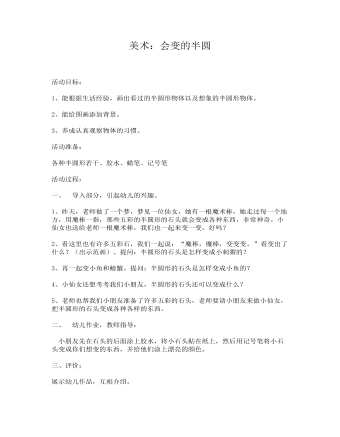
美术会变的半圆课件教案
2、能给图画添加背景。3、养成认真观察物体的习惯。活动准备:各种半圆形若干、胶水、蜡笔、记号笔活动过程:一、 导入部分,引起幼儿的兴趣。1、昨天,老师做了一个梦,梦见一位仙女,她有一根魔术棒,她走过每一个地方,用魔棒一指,那些五彩的半圆形的石头就会变成各种东西,非常神奇。小仙女也送给老师一根魔术棒,我们也一起来变一变,好吗?
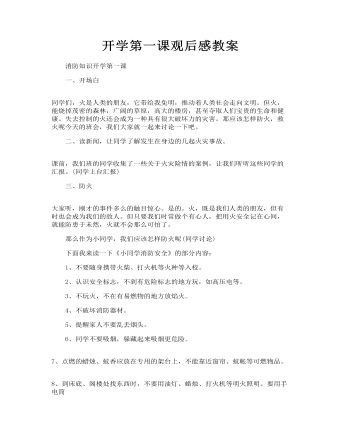
开学第一课观后感教案
三、防火 大家听,刚才的事件多么的触目惊心。是的。火,既是我们人类的朋友,但有时也会成为我们的敌人。但只要我们时常做个有心人,把用火安全记在心间,就能防患于未然,火就不会那么可怕了。 那么作为小同学,我们应该怎样防火呢(同学讨论) 下面我来读一下《小同学消防安全》的部分内容: 1、不要随身携带火柴、打火机等火种等入校。 2、认识安全标志,不到有危险标志的地方玩,如高压电等。 3、不玩火,不在有易燃物的地方放焰火。 4、不破坏消防器材。 5、提醒家人不要乱丢烟头。 6、同学不要吸烟,躲藏起来吸烟更危险。

